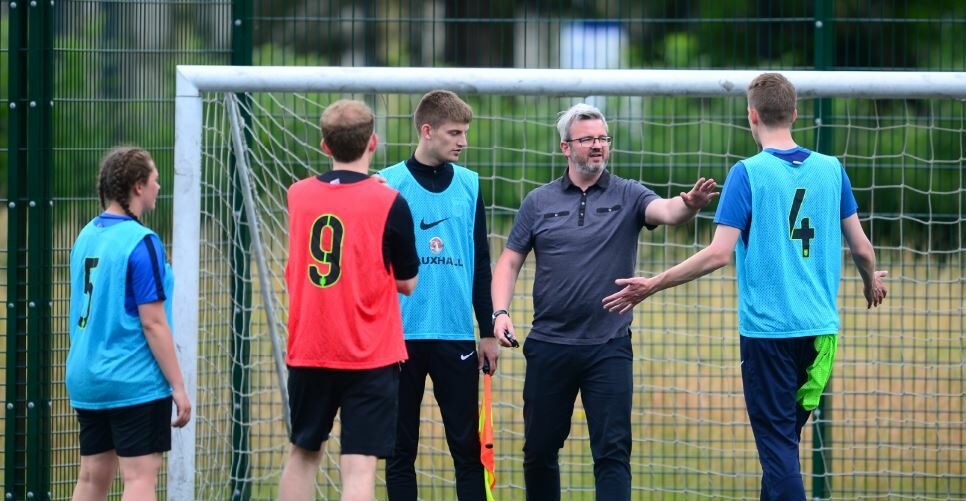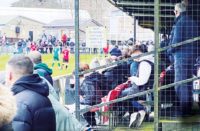By Matt Badcock,
It's a simple comment, but it cuts deep. To set the scene, it's a July afternoon at Warwick University and I am living out a real-life version of “You are the Ref”.
Whistle in hand, cards in pocket, I'm the man in the middle. Play is on-going but something, and I don't quite know what, is about to happen. Then it does.
A ball comes on from off the pitch and halts the attacking team's momentum. They are in uproar and my assistant referee is frantically flagging.
I go over, ushering away the protesting players – the defending team have joined in by now – so I can get a brief from my fellow official.
He's seen the ball kicked in by someone in the defending team's dug-out. But he doesn't know who.
A bell chimes in my head. I saw this earlier in a presentation of the new laws of the game. If the offender can't be identified, the senior coach – or manager – is to be cautioned or sent-off.
I make my way over to the technical area. I know I need to show one of the two cards burning a hole in my pocket. But what one? I'm trying to slow my mind down before making the decision but the players are still on my back demanding action. Then comes that comment: “You don't know what you're doing, do you?” The truth hurts.
—————————————————————————————————————————————————————
It's 10am on Saturday morning and the 2019-20 National League season kicks off in a fortnight. Gathered in a reception area, fifty Level 2B referees fill the room with hubbub as they prepare for a weekend-long pre-season training camp put on by the Football
Association.
It's a two-day programme that will consist of classroom-based development sessions – including a focus on the 27 new laws, talks, practical and fitness work on the grass, some insight from professional footballer Peter Vincenti and, on Saturday night, the 2B Referee Knowledge Assessment – also known as a pub quiz (no pub).
The referees are in charge of National League North and South games this season. In the room, there are 23 who have just been promoted to this level. If they haven't yet passed the strict fitness test – some footballers would struggle to get through. They are fit, determined and – we can exclusively reveal – all human.
There are a number of misconceptions around officials in this country, often the myths perpetuated through word of mouth. One is that the officials take a course, pass and off they go, rising up the ladder, ticking assessors' boxes until they reach the Football League or a level they are comfortable at. The other is they receive no further contact or development from the FA.
Perhaps there was a pinch of truth in that last bit many years ago where officials would meet up maybe once a season for two hours.
Dialogue
But The FA are in fact putting lots of investment into their officials' development and National Referee Development Manager Dan Meeson, who leads the weekend, is rightly proud of what they now do. As well as this summer camp, they will also meet in November and February, and each individual referee will be in constant dialogue throughout the season with their coach – both in person and on the phone – who are all stationed at the back of the room we are in.
The day starts with a picture of a Heathrow hotel. The aim for everyone in the room is to have their best season so they are sat in those surroundings in 12 months' time – along with the other National League Step 1 whistlers.
For now, Step 2 is the, not insignificant, challenge. All 50 are on a chosen path. They will only referee – not like in the past where they would also take line appointments further up. As well as Step 2, they will also take charge of Women's Super League matches and be given fourth official appointments in League One and Two.
Meeson gives a recap of the new rules, questions are fielded – some answered with a bit of ribbing, which shows the team ethic among the group.
It's important because one of the most fascinating aspects of the first morning is to come in what proves to be an open and honest forum.
Clips from Step 2 matches played last season are put on the big screen. One shows a crucial point in a game. A team attacks, the striker catches – or does he – the ankle of a defender who goes down. Play is waved on, the ball comes to another attacker and he scores. In the aftermath, the referee receives some dissent and a red card eventually is shown.
In groups, the decision is debated. It's interesting to see how some think the first incident was a foul and others don't. Then the dissent – did the red card need to be shown when the dissent wasn't obvious to anyone in the crowd? Opinions differ.
In another example, a melee breaks out during a game, which leads to the referee showing a player from each side a red card. Again, the incident is debated. The referee is praised for not being sucked in to the scrum. When the clip is played again, he's practically in the middle of it.
It's all about learning. And we also get an extra layer of insight. The referee in each clip is in the room and can give their perspective. What had happened before, what did the game expect in that situation or what did the player say? There are also examples of good practice.
Scenario
The popular opinion is refereeing is getting worse. The FA say their stats – the marks given by clubs and their assessors – actually show the standard has never been better.
After the clips there is an interesting presentation on how they can use the assessing system for WSL games to their benefit before lunch and an afternoon session outside.
The group is split with one half undergoing some gruelling fitness work while the others are put through their paces and tested in practical situations on the new laws.
A group of young referees are drilled to engineer a specific scenario and then apply pressure.
Eventually the whistle is in my possession and I receive plenty of encouragement. Football League referee Leigh Doughty, on hand to impart his own experience of progression through Non-League and now onto the EFL, hands me his cards. I'm in charge.
—————————————————————————————————————————————————————
Walking towards the dug-out with that comment ringing in my ears, everything tells me I should show the senior coach the red card. I bottle it and show a yellow. Red seemed too drastic.
I restart the game with a drop ball and although I'm worried that's not right, it was the correct decision and the scenario comes to an end.
Chris Powell, an experienced Step 1 referee now coach, talks me through it. I ushered the protesting players away well and didn't turn my back when speaking to my assistant. It's going well. I correctly identified the senior coach. Easy this.
But the card should have been red. It's obvious out of the heat of the moment. My other issue is, he says, I swore at the bench before I issued the card. I swear I didn't. The point is I should have taken my assistant with me to the technical area for back-up just in case a story is concocted against me later on. I feel some relief when a qualified referee makes the same slip but this is the time to make those mistakes.
Don't know what I'm doing? It's certainly not easy stepping in those shoes. I'm glad I did. And I'll have more empathy for those who do from now on.




















